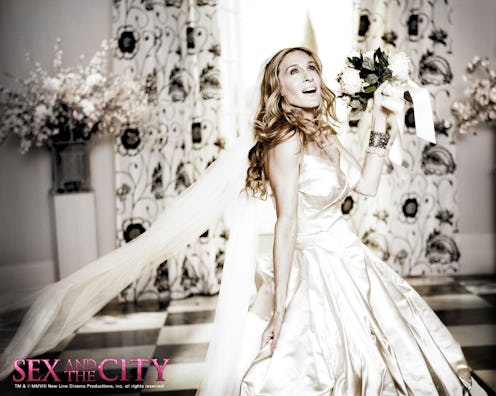Entertainment
Women on TV Shouldn't Always Get Fairytale Endings

In this week's New Yorker, Emily Nussbaum tackles the highly influential, deeply polarizing nature of the characters on Sex and the City, and investigates the show's fall from grace as an innovator of girl-centric television. She brilliantly parses through six seasons of ups and downs as the series struggled with issues of identity and audience after creating TV's first female antihero in Carrie Bradshaw.
But her argument pushes past congratulating the writers of SATC for recreating a genre, and addresses a question about female-directed TV that isn't asked nearly frequently enough: In the years since Carrie was introduced as a flawed, often unlikeable even while glitter-soaked heroine, television writers have been praised time and time again for creating real-life female characters that follow in her footsteps: Homeland's Carrie Mathison and Girls' Hannah Horvath stand out as TV heroines who are loved for their most unappealing qualities. But more often than not, anti-heroines reach a point where they simply can't find a way to finish out a plausible plot line without the abrupt arrival of a knight in shining armor.
Nussbaum concludes her piece by talking about the ending of Sex and the City's series finale, and the sense of giving-in that she took away from Carrie's phone call from Big.
[...] it also showed a failure of nerve, an inability of the writers to imagine, or to trust themselves to portray, any other kind of ending—happy or not. And I can’t help but wonder: What would the show look like without that finale? What if it were the story of a woman who lost herself in her thirties, who was changed by a poisonous, powerful love affair, and who emerged, finally, surrounded by her friends? Who would Carrie be then?
These questions are reminiscent of the ones that arose in my mind while I watched Adam sprinting, shirtless, across Brooklyn to reach a desperate and incapable Hannah in the season two finale of Girls. Hannah is a character who was popularized as a blindly passionate and highly self-motivated, if not entirely down-to-earth, 20-something. Season two saw her fail to hold on to every semblance of success or support in her life, gradually transforming a perfectly good anti-heroine into someone irredeemable and uninteresting. Almost as if mocking the ending of it's frequently compared-to predecessor (and if it was referencing SATC, I take this entire article back), Girls blatantly chose to avoid any real agency on Hannah's part, and instead allowed her to fall limply into the arms of her emotionally unstable, vaguely abusive love interest.
I'm too young to know what the end of the fight for a happy, independently motivated, self-empowered and self-sufficient lifestyle realistically looks like for an upper-middle class female journalist in New York. But the reluctancy of TV writers to show me anything besides a last-minute romantic rescue makes me feel worried, confused, and a little insulted.
image: New Line Cinema Productions